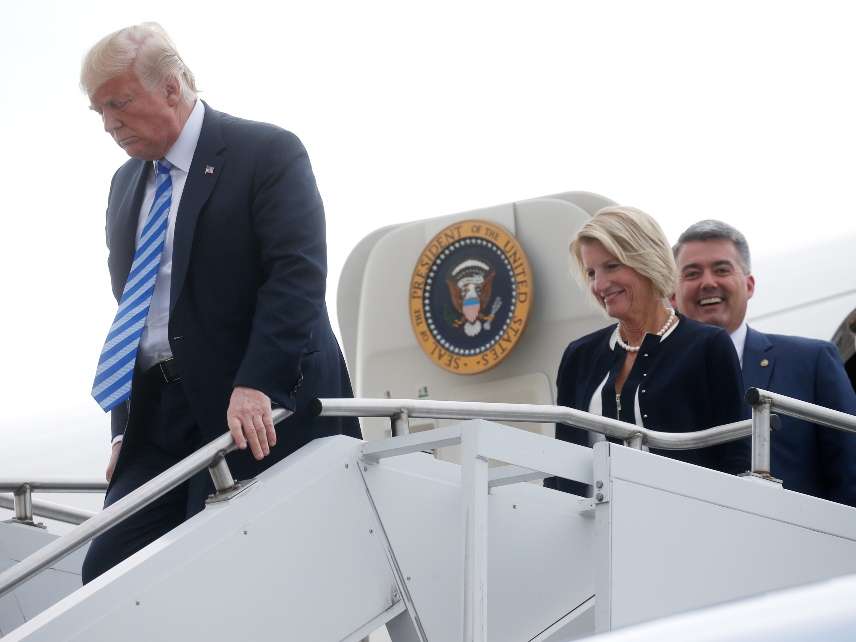Anti-Pot Staffers Conspire to Turn Trump Against Marijuana Federalism
A White House policy committee is collecting information on "negative trends" and "threats" associated with legalization.

The Office of National Drug Control Policy (ONDCP) is required by statute to "take such actions as necessary to oppose any attempt to legalize" federally prohibited drugs. Toward that end, BuzzFeed's Dominic Holden reports, the ONDCP has asked agencies across the executive branch to share any information that reflects badly on marijuana legalization, including "data demonstrating the most significant negative trends." According to internal memos that Holden obtained, the material will be distilled by something called the Marijuana Policy Coordination Committee, which seems intent on getting Donald Trump to reconsider his support for letting states go their own way in this area.
While running for president, Trump repeatedly said the federal government should not obstruct marijuana legalization by the states, although he expressed concern about the consequences. Last June, notwithstanding Attorney General Jeff Sessions' threats of a federal crackdown, the president said he "probably will end up supporting" the Strengthening the Tenth Amendment Through Entrusting States (STATES) Act, which would exempt state-legal marijuana activities from the federal ban. That position clearly did not sit well with some of the president's advisers.
Since Sessions is out of favor with the White House and the acting director of the ONDCP, James Carroll, seems to be little more than a placeholder, someone else is probably behind the effort to sway Trump against marijuana federalism. The Washington Monthly's Nancy LeTourneau suggests that White House Chief of Staff John Kelly, a gung-ho drug warrior who used to oversee interdiction as secretary of homeland security and head of the U.S. Southern Command, is "the most likely culprit." Kelly has repeatedly complained about the demoralizing effect that marijuana legalization has on America's allies in the war on drugs.
Holden reports that the ONDCP asked agencies and departments to supply "two-page, bulleted fact sheets that identify marijuana threats," along with what a White House directive described as "a story, relating an incident or picture, that illustrates one or more of the key areas of concern related to use, production, and trafficking of marijuana." The aim seems to be an easily digestible presentation that will reinforce the president's doubts about the wisdom of legalization and make him forget his commitment to respecting state autonomy.
According to a summary of a July 27 White House meeting with department officials that Holden quotes, the presidential propaganda project is all about balance. "The prevailing marijuana narrative in the U.S. is partial, one-sided, and inaccurate," the summary says. "Staff believe that if the administration is to turn the tide on increasing marijuana use there is an urgent need to message the facts about the negative impacts of marijuana use, production, and trafficking on national health, safety, and security."
The BuzzFeed report prompted criticism from legislators who represent Colorado, the first state to allow recreational sales of marijuana. "By cherry-picking data to support pre-ordained and misinformed conclusions on marijuana, the Trump administration has further eroded any credibility it had on this issue," writes Sen. Michael Bennet (D-Colo.) in a letter he sent yesterday to Carroll, the acting drug czar. "I am deeply concerned by this intentional effort to mislead the American people. At a time when we should be investing in objective and peer-reviewed scientific research on marijuana and the effects of legalization, the White House is instead using taxpayer money to spread a politically driven narrative."
Bennet overlooks the fact that Congress tasked the ONDCP with doing just that, since the office is statutorily bound to oppose legalization by any means necessary. But his dismay is probably shared by other members of Congress, Republicans as well as Democrats, who represent states that have legalized marijuana and who thought the president was committed to respecting those choices. Trump's decision to "probably" support the STATES Act grew out of a dispute with Bennet's fellow Colorado senator, Cory Gardner, a Republican who blocked Justice Department appointments in response to Sessions' threats against state-legal cannabis.
"Since the campaign, President Trump has consistently supported states' rights to decide for themselves how best to approach marijuana," Gardner said after conferring with Trump last April. Gardner said the president had assured him that new Justice Department priorities under Sessions "will not impact Colorado's legal marijuana industry" and that Trump "will support a federalism-based legislative solution to fix this states' rights issue once and for all." No matter how persuasive the talking points soliciting by the ONDCP, reneging on that commitment will carry a political cost.


Show Comments (58)